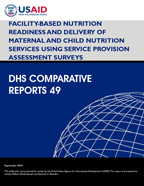- PUBLICATIONS
- JOURNAL ARTICLES
- ORDER PUBLICATIONS
Publications Summary
- Document Type
- Comparative Reports
- Publication Topic(s)
- Nutrition
- Language
- English
- Recommended Citation
- Mallick, Lindsay, Gheda Temsah, and Rukundo K. Benedict. 2018. Facility-based Nutrition Readiness and Delivery of Maternal and Child Nutrition Services Using Service Provision Assessment Surveys. DHS Comparative Reports No. 49. Rockville, Maryland, USA: ICF.
- Download Citation
- RIS format / Text format / Endnote format
- Publication Date
- September 2018
- Publication ID
- CR49
